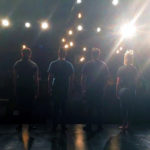This is the first line sung by the collection of assassins in Stephen Sondheim and John Weidman’s darkly comic American musical, Assassins. The line itself is a twisted riff on one of our nation’s bedrock notions; Thomas Jefferson’s famous declaration that we all have the right to, “life, liberty, and the pursuit of happiness.” However, the sentiments of the assassins and Mr. Jefferson don’t exactly align; The Declaration of Independence tells us we have the right to pursue happiness, nothing about actually attaining it.
It is an enormous distinction, and one that could be dismissed as a misinterpretation only capable by someone so lost and deranged as a would-be Presidential assassin. To do so would be to deny the uncomfortable truth about human nature, particularly those of us who are part of the American experiment. Have we not all felt at one time that happiness is something that we “deserve”; that we have a “right” to? If we are not happy in the moment, we often look for reasons to blame that lack of happiness on; an illness, a failed relationship, a lack of job, those “others”, our leadership. How many millions in this country have blamed the state of their lives on Barack Obama? That a “President Hillary Clinton” would make it worse? Not all of those searching souls would reach for a gun and commit an act of violence to correct the wrongs they think have been levied upon them, but just because only a handful of Americans have walked down that dark path doesn’t change the fact that we all at one time or another have blamed outside forces for the state of our lives.
Coupled with this fact is another unique aspect of American life; our obsession with celebrity. The idea that fame is the coin of the realm is one that was sparked by the advent of television and fanned into a conflagration with the explosion of the internet. In a world of hits and retweets, where your job description can be “Internet Celebrity” or “YouTube Content Provider,” is it really surprising that some will pursue fame (or infamy) by any means necessary? What would the national disgraces in Assassins have done with the social media age?
And then there are the guns. Everyone we meet in Assassins made the gun their weapon of choice (with the darkly comical exception of Sam Byck, who still needed one to carry out his plan.) The easy thing to do is to focus on the damaged person who made a terrible decision, and not the weapon they tried to implement that decision with. But we are a nation that has decided that the right to possess our weapons of choice has trumped the lives of our citizens, our police officers, our children. Is it really a shock that a broken person looking to right perceived wrongs would turn to a tool of devastation that is easier to obtain than a driver’s license?
It would be so simple to shut out the characters of Assassins with a dismissive, “bad people do bad things.” The challenge is not to focus on the differences, but rather to look closely at the similarities between ourselves and these unfortunate realities of American history. No country on earth obsess over its monsters like Americans do; we should have the courage to look those monsters in the eyes, and brace ourselves for any recognizable features we may find there.

